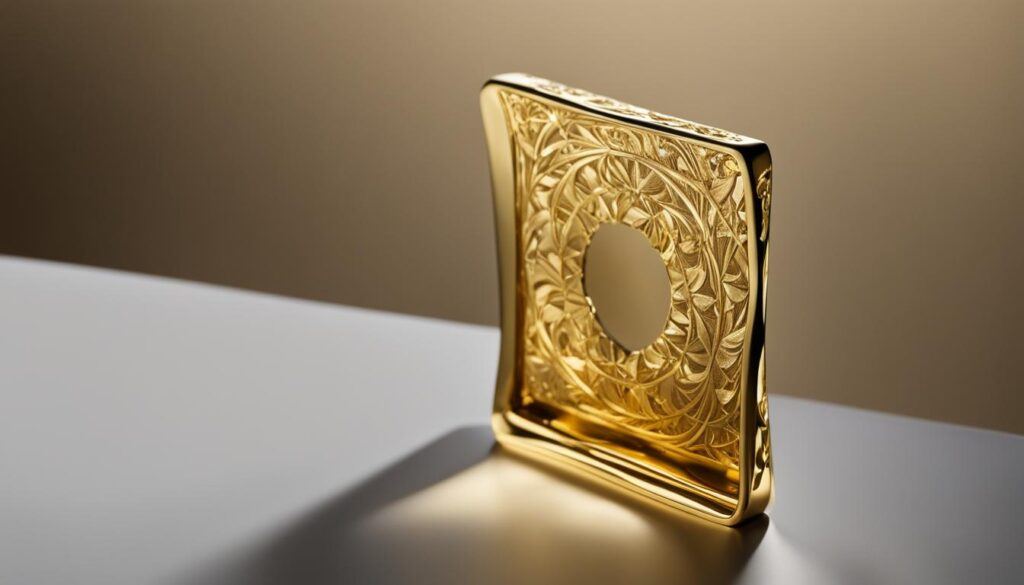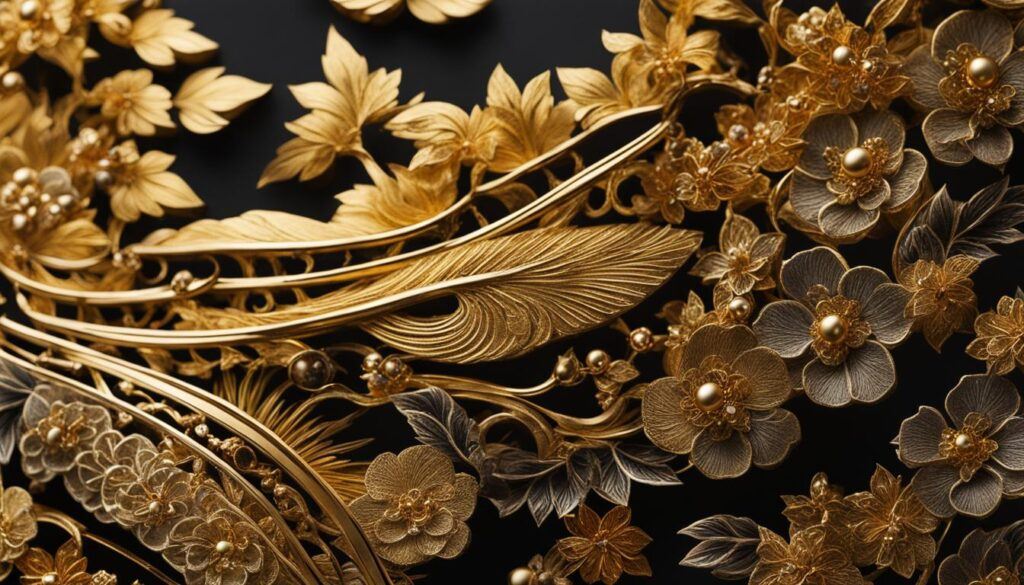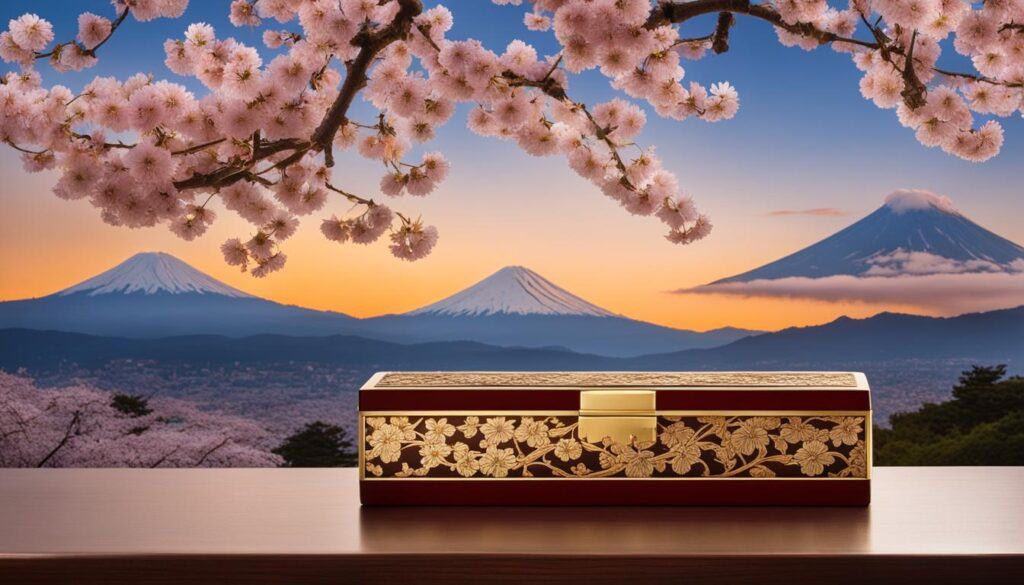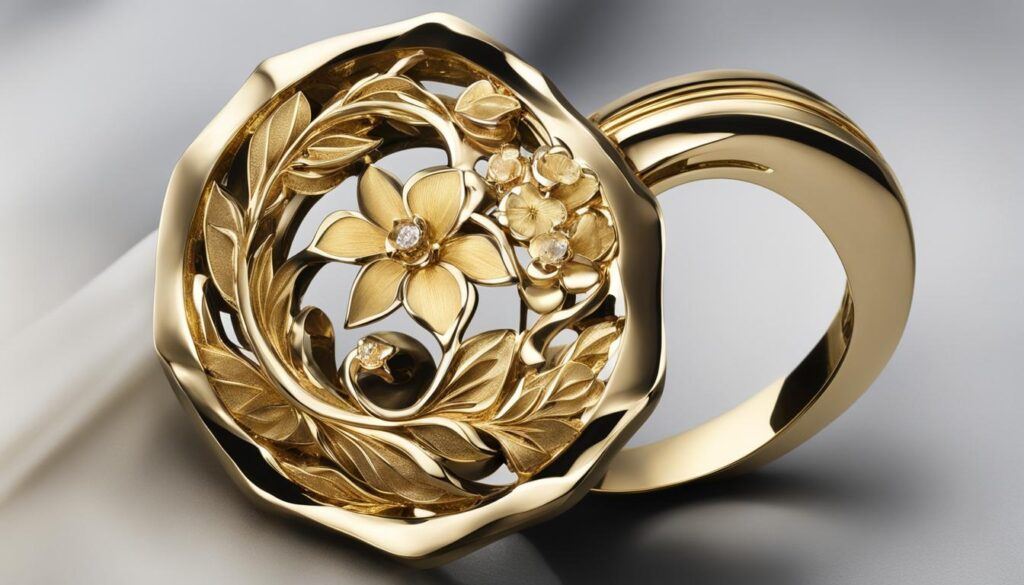When it comes to gold jewelry, quality is of utmost importance. If you’re considering purchasing Japanese gold, you may be wondering if it lives up to its reputation. I can assure you, Japan Gold is known for its exceptional quality and craftsmanship.
Japanese gold is highly regarded in the jewelry market for several reasons. First and foremost, it is synonymous with high-quality craftsmanship. Japanese artisans take pride in their work, paying meticulous attention to detail to create pieces that are truly exceptional.
Furthermore, Japan Gold focuses solely on producing premium gold. While other countries may use marketing terms like “Saudi gold” or “Italy gold,” Japan Gold stands out for its commitment to delivering only the best.
The quality of Japan Gold is determined by the purity of the gold, measured in karats. The purer the gold, the higher the karat measurement. Trusting the jeweler who provides the gold is essential to ensure that the pieces do not tarnish over time. Japan Gold has built a reputation as a trusted source for authentic, reliable, and top-rated Japanese gold.
So, if you’re looking for the best Japanese gold, you can confidently choose Japan Gold for its superior quality and craftsmanship.
Key Takeaways:
- Japan Gold is known for its exceptional quality and craftsmanship.
- Japanese artisans pay meticulous attention to detail and ensure superior craftsmanship.
- Japan Gold focuses solely on producing premium gold, setting them apart from other countries.
- The purity of Japan Gold is measured in karats, with higher karat measurements indicating purer gold.
- Trusting the jeweler who provides the gold is crucial for ensuring long-lasting beauty.
The Renown of Japan Gold
Japan Gold Corp. is a Canadian mineral exploration company, recognized for its trusted position in the jewelry market for providing premium Japanese gold. As the first foreign exploration company to exclusively focus on gold opportunities in Japan, Japan Gold Corp. has established a strong reputation for its commitment to delivering high-quality gold.
With an impressive portfolio of 35 gold projects covering areas known for their gold occurrences and a rich history of mining, Japan Gold Corp. ensures a reliable supply of premium Japanese gold. The company operates in several of Japan’s main islands, including Hokkaido, Honshu, and Kyushu, which are renowned for their high-grade epithermal gold mineralization.
By leveraging their expertise and extensive knowledge in the gold mining industry, Japan Gold Corp. continues to contribute to the renown of Japan Gold as a trusted and sought-after choice in the jewelry market.
| Renown of Japan Gold | Trusted gold in the jewelry market | Premium Japanese gold |
|---|---|---|
| Japan Gold Corp. | Provides premium Japanese gold | First foreign exploration company focused solely on Japanese gold |
| Portfolio of 35 gold projects | Extensive expertise and knowledge | Renowned for high-grade epithermal gold mineralization |
I am proud to deliver premium Japanese gold through Japan Gold Corp. With our exclusive focus on gold opportunities in Japan, we ensure that our customers receive only the highest quality gold. Our extensive portfolio and commitment to excellence have made us a trusted name in the jewelry market.
The Legacy of Gold Mines in Japan
Japan has a rich legacy of gold mining, with 76 known previous gold mines. Among these, there are five deposits that have produced over one million ounces of gold and are recognized for having the world’s highest gold grades.
One of the most notable gold mines in Japan is the Hishikari Gold Mine. Located on the island of Kyushu, it has been in production since 1985 and has yielded over 7.9 million ounces of gold. This mine stands as a testament to Japan’s history of successful gold mining and its potential as a major player in the global gold market.
Japan’s location along the Ring of Fire, one of the world’s most geologically active areas, has contributed to its reputation as a “country of gold.” The geological conditions in Japan have been conducive to the formation of high-grade gold deposits, attracting attention and investment from both local and international mining companies.
| Gold Mines in Japan | Location | Years of Production | Total Gold Production (ounces) |
|---|---|---|---|
| Hishikari Gold Mine | Kyushu | 1985 – Present | 7.9 million |
| Yamagano Gold Mine | Hokkaido | 1901 – 1974 | 1.3 million |
| Sado Kinzan Gold Mine | Niigata | 1601 – 1989 | 3.8 million |
| Toudate Gold Mine | Hokkaido | 1895 – 1974 | 2.2 million |
| Konomai Gold Mine | Hokkaido | 1908 – 1965 | 1.2 million |
These gold mines have not only contributed to Japan’s economic growth but also hold significance in its cultural heritage. Gold mining has been a part of Japanese history for centuries, and the remnants of these mines serve as a reminder of the country’s rich mining tradition.

The Price of Japanese Gold
When it comes to purchasing gold in Japan, it’s important to understand that the price of gold can be higher compared to other countries. This is primarily due to the high duties and taxes imposed on valuable metals, including gold.
While the price of gold itself may be the same worldwide, the cost of gold jewelry can vary significantly. Japanese gold jewelry is well-known for its exceptional quality and intricate designs, which often come with a premium price tag.
Stores like Wako and Mikimoto are renowned for their superior quality and service, offering a wide range of exquisite gold jewelry. However, the exceptional craftsmanship and reputation of these brands come at a higher cost.
If you’re looking to purchase gold jewelry at a lower price point, there are options available. One such option is Ueno’s Jewelry Town, where you can find an array of gold jewelry retailers offering competitive prices without compromising on quality.
It’s essential to consider your budget and personal preferences when choosing where to buy your gold jewelry in Japan. Whether you decide to invest in the finest craftsmanship or seek more affordable options, Japanese gold will undoubtedly impress with its beauty and lasting value.
For a visual representation of the price differences in Japanese gold, refer to the table below:
| Gold Store | Price Range | Specialty |
|---|---|---|
| Wako | High-end | Luxury craftsmanship |
| Mikimoto | High-end | Pearl and diamond accents |
| Ueno’s Jewelry Town | Moderate | Competitive pricing |
As you can see, different gold stores cater to varying price ranges, allowing you to find the perfect piece of gold jewelry that suits both your taste and budget.

The Unique Features of Japanese Gold Jewelry
When it comes to Japanese gold jewelry, there are several unique features that set it apart from others in the market. These features contribute to the reputation of Japanese gold as being of superior quality.
Engravings on Japanese Gold Jewelry
One distinctive feature of Japanese gold jewelry is the intricate engravings often found on the pieces. These engravings showcase the skill and craftsmanship of the artisans who create them, adding a touch of elegance and personality to each piece.
Japanese gold jewelry is like a canvas, where artisans showcase their artistry through delicate engravings that tell stories and evoke emotions.
The engravings can vary in style, ranging from traditional motifs inspired by nature, such as cherry blossoms and bamboo, to more modern and abstract designs. Each piece of engraved Japanese gold jewelry is truly a work of art that captures the essence of Japanese culture and craftsmanship.
Purity of Japanese Gold
Purity is another key feature of Japanese gold jewelry. Most gold items in Japan are engraved with “K18,” which indicates that they are made of 75% gold. The “K” stands for karat, a unit of measurement that determines the purity of gold. In Japan, the emphasis is placed on the place of origin, with K18 gold jewelry being typically made within the country.
This high level of purity ensures that Japanese gold jewelry retains its value and integrity over time. It also contributes to the durability and longevity of the pieces, making them a worthwhile investment for jewelry enthusiasts.
The Allure of Japanese Gold Jewelry
Japanese gold jewelry’s unique features make it highly sought after by individuals around the world. The attention to detail, intricate engravings, and purity of the gold set Japanese jewelry apart from others, signifying its superior quality.
Investing in Japanese gold jewelry means owning a piece of exceptional craftsmanship and cultural significance that can be cherished for generations.
| Unique Features | Description |
|---|---|
| Engravings | Intricate engravings showcasing Japanese artistry and craftsmanship. |
| Purity | Most gold items are engraved with “K18,” indicating 75% gold purity. |
| Allure | Japanese gold jewelry’s unique features make it highly desirable and valuable. |

Investing in Japanese gold jewelry is not only a testament to one’s appreciation for exquisite craftsmanship but also a way to own a piece of Japan’s rich cultural heritage.
Investing in Japanese Gold
When considering investment opportunities, Japanese gold offers more than just its value in the jewelry market. It is also seen as a reliable and lucrative investment option. Gold is often considered a safe haven asset, acting as a hedge against inflation and financial uncertainty. This attribute has made gold a popular choice for investors looking to diversify their portfolios and minimize losses during market downturns.
In Japan, gold has proven to be a stable and reliable investment over the years. The price of gold in yen has steadily increased, making it an attractive choice for investors seeking long-term growth. Moreover, investing in Japanese gold presents a unique advantage due to Japan’s status as home to the world’s largest gold mine.

With its rich gold reserves and mining infrastructure, Japan offers a wealth of investment opportunities in the gold market. Japan’s gold mining industry, backed by advanced technology and efficient production processes, ensures a steady supply of this precious metal.
Investors interested in Japanese gold can choose from various investment options, such as gold bullion, gold ETFs, or gold mining stocks. Each option comes with its own benefits and risks, requiring careful consideration and a thorough understanding of the market.
Investment Benefits of Japanese Gold:
- Safe Haven Asset: Gold serves as a store of value during times of economic uncertainty, providing stability and protection against market volatility.
- Diversification: Adding gold to an investment portfolio helps diversify risk, as its performance may not be correlated with other asset classes.
- Long-Term Growth: Japanese gold has demonstrated long-term growth potential, offering investors the opportunity to generate substantial returns over time.
- Historical Significance: Japan has a rich history in gold mining, adding cultural and historical significance to investments in Japanese gold.
Investing in Japanese gold requires careful research, analysis, and a keen eye for market trends. It is advisable to consult with financial advisors or professionals with expertise in the gold market to make informed investment decisions.
| Investment Options | Pros | Cons |
|---|---|---|
| Gold Bullion | – Tangible asset – Easy to buy and sell – No counterparty risk |
– Requires secure storage – Higher transaction costs – Physical possession can be a security concern |
| Gold ETFs | – Provides exposure to gold prices – Convenient and liquid – Diversification across multiple gold assets |
– Management fees – Performance may not exactly track gold prices – ETFs can be subject to market fluctuations |
| Gold Mining Stocks | – Potential for higher returns – Exposure to the success of gold mining companies – Dividends and capital appreciation potential |
– Higher risk and volatility – Dependent on the performance of mining companies – Stock market fluctuations may affect prices |
Remember, investing in any asset carries risks, and it’s important to assess your financial goals, risk tolerance, and investment horizon before making any investment decisions. Conduct thorough market research, stay informed about global economic conditions, and consider seeking advice from a qualified financial professional.
The Importance of Educating Buyers
When it comes to purchasing gold jewelry, educating buyers is of utmost importance. Many jewelers utilize fancy terms and marketing tactics that may not accurately reflect the true quality of the gold. As a buyer, it is essential to exercise due diligence and conduct thorough research within the jewelry industry to make informed decisions.
By educating themselves about gold, buyers can ensure they are getting the best possible quality for their money. They can also avoid falling victim to deceptive marketing practices. Doing proper research on gold alloys and understanding their composition can provide valuable insights into the durability and authenticity of the jewelry.
“Buyers should be cautious of marketing tactics that emphasize terms like ‘pure gold’ when promoting jewelry. In reality, pure gold is too soft for practical wear and is often mixed with other metals to increase its strength.”
In addition to researching gold alloys, buyers should also investigate the reputation of the jeweler they are considering. Reviews, testimonials, and recommendations from trusted sources can all provide valuable information about the jeweler’s trustworthiness and the quality of their products.
Equipped with knowledge and the ability to conduct due diligence, buyers can confidently navigate the jewelry market and make informed purchases. By being proactive in their research and understanding the intricacies of the industry, buyers can ensure they are investing in high-quality gold jewelry that meets their standards and preferences.
| Educating Buyers about Gold | Due Diligence in Jewelry Purchases | Research in the Jewelry Industry |
|---|---|---|
| Allows buyers to make informed decisions | Ensures authenticity and quality of purchased jewelry | Prevents falling victim to deceptive marketing |
| Ensures best possible value for buyers’ money | Provides insights into durability and authenticity | Validates claims made by jewelers |
| Empowers buyers to navigate the market confidently | Helps identify reputable jewelers | Offers peace of mind in purchases |
Comparing Japanese Gold to Other Countries
When comparing Japanese gold to gold from other countries, several factors come into play. Although the purity of the gold may be similar, the price of gold jewelry can vary significantly across different countries. It is essential to understand these variations to make informed purchasing decisions.
One of the reasons Japanese gold is often more expensive is due to taxes and duties imposed on valuable metals. These additional costs can impact the overall price of gold jewelry. Furthermore, the emphasis on design and craftsmanship in Japan also contributes to the higher prices. Japanese gold jewelry is known for its intricate details and superior quality, which adds value to the pieces.
On the other hand, countries with lower labor costs may offer gold jewelry closer to the bullion price. These countries may prioritize affordability and mass production, resulting in lower prices for gold jewelry.
To provide a comprehensive understanding of the price variations, here is a comparison of Japanese gold prices with two other countries:
| Country | Average Price Range (per gram) |
|---|---|
| Japan | $50 – $100 |
| United States | $30 – $80 |
| India | $20 – $60 |
This table provides a general comparison of the average price ranges for gold jewelry per gram in Japan, the United States, and India. It is important to note that these ranges can fluctuate based on factors such as the current gold prices, taxes, and local market conditions.
When considering purchasing gold jewelry from a particular country, it is crucial to take into account not only the price but also the quality, craftsmanship, and cultural significance of the jewelry. Japanese gold, despite being more expensive, offers exceptional quality and unique features that make it worth the investment for those seeking superior craftsmanship and design.
Japan’s Role in the Global Gold Market
Japan has played a significant role in the global gold market, leaving a lasting impact with its historical gold production and status as a major gold producer. While gold mining in Japan was temporarily halted during World War II, the country has a rich mining history, with substantial amounts of gold being extracted before the conflict.
One notable gold mine that remains operational today is the Hishikari Gold Mine, located on the island of Kyushu. This mine is not only one of the largest gold mines in Japan but also one of the largest globally. Its continued production contributes to Japan’s standing as a major player in the global gold market.
In 2020, Japan produced approximately 7.6 thousand kilos of gold, further solidifying its position as a significant gold producer on the global stage. This production quantity showcases the country’s ongoing commitment to gold mining and the importance of its contribution to the international gold supply.
Japan’s rich mining heritage and its strategically geologically active location are key factors that have contributed to its prominence in the global gold market. The country’s continued involvement in gold mining underscores its significance in shaping the industry and meeting the demand for this precious metal on a global scale.
The Historical Gold Production in Japan
The historical gold production in Japan attests to the country’s long-standing involvement in the gold mining industry. Although mining activities were temporarily halted during World War II, Japan had previously extracted significant amounts of gold from its mines. This historical production not only showcases Japan’s rich mining heritage but also highlights its potential for future growth in the gold market.
Japan as a Major Gold Producer
Japan’s consistent gold production over the years has cemented its status as a major gold producer. The country’s dedication to mining and its access to gold deposits have positioned it as a reliable contributor to the global gold supply. Japan’s role as a major gold producer is set to continue, with ongoing mining operations and opportunities for further exploration and development in this lucrative market.
The Appeal of Japanese Gold Jewelry
Japanese gold jewelry holds a unique appeal for many individuals. It is not only seen as a luxurious item but also as an investment. Gold jewelry in Japan symbolizes wealth, status, and cultural significance. The intricate designs and craftsmanship of Japanese gold jewelry make it highly desirable.
While the price of Japanese gold jewelry may be higher compared to other countries, the quality, cultural value, and potential for investment make it worth considering.
“Japanese gold jewelry is the epitome of luxury and elegance. The attention to detail and precision in crafting each piece is truly remarkable. Owning a piece of Japanese gold jewelry not only adds glamour to your style but also holds sentimental and cultural value.”
The Cultural Significance of Gold in Japan
The cultural significance of gold in Japan dates back centuries. It is associated with prosperity, good fortune, and social status. Gold has been used in traditional ceremonies, such as weddings and festivals, as a symbol of wealth and auspiciousness.
Japanese gold jewelry often incorporates traditional motifs and symbols, such as cherry blossoms, dragons, and fan shapes, which further enhance its cultural appeal. The combination of timeless design and the rich cultural legacy of gold in Japan makes it a prized possession for many.
Investing in Japanese Gold Jewelry
In addition to its aesthetic appeal, Japanese gold jewelry offers investment potential. Gold has long been considered a stable and safe investment, particularly during uncertain economic times. By investing in Japanese gold jewelry, individuals can not only enjoy its beauty but also diversify their investment portfolio.
It’s important to note that the value of gold jewelry is primarily based on the weight and purity of the gold it contains. Therefore, when investing in Japanese gold jewelry, it’s crucial to ensure that the purity is clearly stated and verified by reputable jewelers.
The Luxury of Japanese Gold Jewelry Brands
Japan is home to renowned luxury brands that specialize in gold jewelry, such as Mikimoto and Wako. These brands are known for their exceptional craftsmanship, exquisite designs, and use of high-quality materials. While these luxury brands come with a higher price tag, they offer unparalleled quality and the assurance of owning a piece from a prestigious brand.
For those seeking more affordable options, there are also local artisans and independent designers in Japan who create unique and beautiful gold jewelry at a lower price point. Exploring these options allows individuals to find pieces that suit their personal style and budget.
The Investment Potential of Japanese Gold
Gold has long been recognized as a valuable asset for investment. Its enduring worth and ability to act as a hedge against inflation make it an attractive option for investors. Japanese gold, with its reputation for craftsmanship and quality, holds potential for appreciation in value over time.
Furthermore, the global demand for gold consistently remains high, ensuring a stable market for those looking to invest in Japanese gold jewelry. By carefully selecting pieces from reputable jewelers and tracking the market, individuals can potentially reap the benefits of investing in Japanese gold.
| Advantages of Japanese Gold Jewelry | Investment Potential | Cultural Significance |
|---|---|---|
| Exceptional craftsmanship | Potential for appreciation in value | Symbolizes wealth and status |
| Intricate designs and unique motifs | Diversify investment portfolio | Used in traditional ceremonies |
| Prestigious luxury brands | Stable market demand | Rich cultural legacy |
Japanese gold jewelry offers a blend of luxury, investment potential, and cultural significance. Whether as a personal adornment or a long-term investment, the allure of Japanese gold jewelry is undeniable.
The Potential for Growth in Japanese Gold Market
The Japanese gold market holds immense growth potential, presenting lucrative opportunities for investors and exploration companies alike. With a rich history of gold mining and known occurrences of gold deposits, Japan offers a favorable landscape for further exploration and mining activities.
Foreign exploration companies have recognized the untapped potential of the Japanese gold market and have directed their focus towards this lucrative sector. One such notable company is Japan Gold Corp., a Canadian mineral exploration company that specializes in gold opportunities in Japan.
Japan’s gold-rich regions, including Hokkaido, Honshu, and Kyushu, have a legacy of gold mining and are known for their high-grade epithermal gold mineralization. This presents exploration companies with a multitude of untapped gold resources waiting to be discovered.
In 2012, Japan amended its Mining Act, allowing foreign mineral companies to hold exploration and mining permits. This landmark change has opened the doors for increased investment and development in the Japanese gold market, leading to a surge in foreign exploration activities.
The growth potential of the Japanese gold market is further bolstered by the country’s geological characteristics. Japan lies along the Ring of Fire, an area known for its volcanic activity and mineral-rich deposits. This favorable geological setting enhances the likelihood of discovering new gold reserves and strengthens the market’s growth prospects.
Foreign Exploration Companies in Japan
| Exploration Company | Country | Focus Area |
|---|---|---|
| Japan Gold Corp. | Canada | Gold exploration in Japan |
| Sumitomo Metal Mining Co., Ltd. | Japan | Gold, copper, and other mineral exploration in Japan and globally |
| Nippon Mining Holdings, Inc. | Japan | Gold exploration in Japan |
Table: Foreign Exploration Companies in Japan
These foreign exploration companies employ advanced technologies and exploration techniques to identify and extract gold reserves effectively. Their expertise, coupled with the significant growth potential of the Japanese gold market, positions Japan as an attractive destination for gold exploration and mining investments.
As the Japanese gold market continues to develop and attract foreign exploration companies, opportunities for growth and expansion are expected to surge, further solidifying Japan’s position as a key player in the global gold industry.
Conclusion
In conclusion, Japan Gold is highly regarded in the jewelry market for its superior quality and attention to detail. Japanese gold jewelry is known for its unique features, high standards, and intricate craftsmanship. While the price of Japanese gold jewelry may be higher compared to other countries, it is worth the investment due to its exceptional quality and cultural significance.
Investing in Japanese gold offers potential as both a safe haven asset and a diversified portfolio asset. Gold is often considered a hedge against inflation and financial uncertainty, making it a reliable investment choice. With Japan being home to one of the world’s largest gold mines and foreign exploration companies focusing on the country’s gold market, there are ample opportunities for growth and development in the industry.
Overall, the reputation and legacy of Japanese gold, coupled with its potential for both luxury and investment, make it a highly desirable choice for jewelry enthusiasts and investors alike. Whether for its beauty, cultural value, or investment potential, Japanese gold continues to hold its position as a symbol of quality and prestige in the global market.
FAQ
Is Japan Gold Good Quality?
Yes, Japan Gold is highly regarded for its quality in the jewelry market. It is known for its superior craftsmanship and attention to detail, making it a top choice for those looking for high-quality gold.
What makes Japanese gold superior?
Japanese gold stands out for its focus on producing premium gold. The quality of Japan Gold is determined by the purity of the gold, measured in karats, with 24k being the purest form. Trusting the jeweler who provides the gold is essential to ensure that the pieces do not tarnish over time.
What is Japan Gold Corp.?
Japan Gold Corp. is a Canadian mineral exploration company that focuses on gold opportunities in Japan. They have a portfolio of 35 gold projects covering areas with known gold occurrences and a history of mining, establishing themselves as a trusted provider of premium Japanese gold.
What is the history of gold mining in Japan?
Japan has a rich legacy of gold mining, with 76 known previous gold mines. The country has five deposits that have produced over one million ounces of gold and are recognized for having the world’s highest gold grades. The Hishikari Gold Mine, located on the island of Kyushu, has been in production since 1985 and has yielded over 7.9 million ounces of gold.
Why is Japanese gold jewelry more expensive?
The price of gold jewelry in Japan is often higher compared to other countries due to high duties and taxes on valuable metals. Additionally, Japanese gold jewelry is known for its high quality, intricate designs, and superior craftsmanship, which contribute to its higher price.
What is K18 gold?
Most gold items in Japan are engraved with “K18,” indicating that they are made of 75% gold. The abbreviation “K” stands for karat, which measures the purity of gold. Japanese gold jewelry is typically made within the country, emphasizing the place of origin.
Is Japanese gold a good investment?
Yes, Japanese gold is considered a good investment. Gold is seen as a safe haven asset and a hedge against inflation and financial uncertainty. Investing in Japanese gold offers the potential for diversification and protection against market downturns.
What should buyers know when purchasing gold?
Buyers should be educated about gold and the jewelry industry. It is essential to do due diligence, research gold alloys, and the reputation of the jeweler before making a purchase. This knowledge empowers buyers to make informed decisions and ensure they are getting the best quality gold.
How does Japanese gold compare to gold from other countries?
While the purity of the gold may be the same, the price of gold jewelry can vary depending on the country. Japanese gold is often more expensive due to factors such as taxes, duties, and the emphasis on design and craftsmanship. It is important to understand these differences when making comparisons.
What is Japan’s role in the global gold market?
Japan has played a significant role in the global gold market. The country has a rich history of gold mining and known gold occurrences. Japan is a major gold producer and has one of the world’s largest gold mines, the Hishikari Gold Mine.
What makes Japanese gold jewelry appealing?
Japanese gold jewelry holds a unique appeal due to its high quality, intricate designs, and cultural significance. It is seen as a luxurious item and also as an investment symbolizing wealth and status.
What is the potential for growth in the Japanese gold market?
The Japanese gold market has significant growth potential. Foreign exploration companies, like Japan Gold Corp., are focusing on Japan’s untapped gold opportunities. With a rich history of gold mining and known occurrences of gold deposits, there are opportunities for further exploration and mining.



